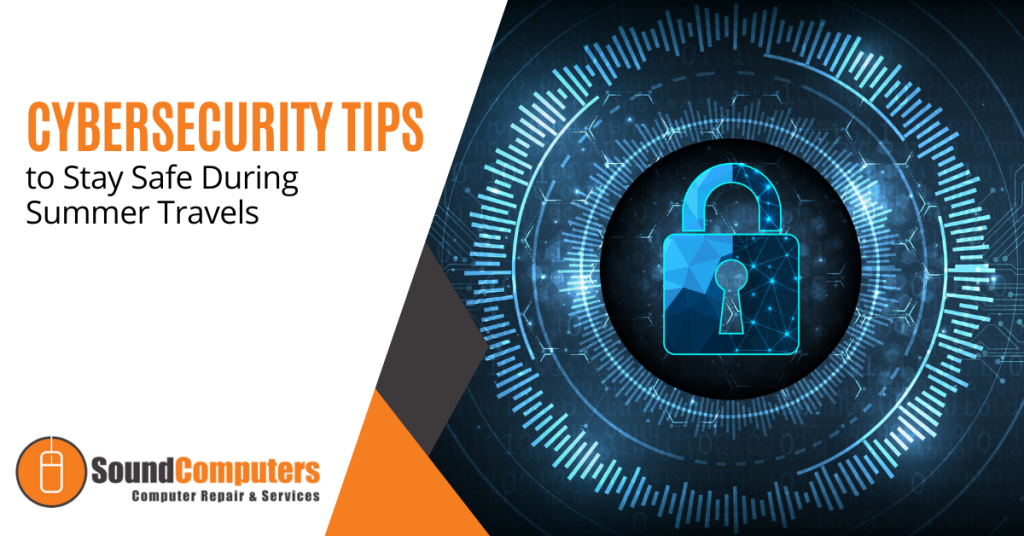
As summer approaches, many individuals prepare to change their environment and arrange their vacations. Those traveling for business assignments and those who wish to spend time away from work with family and friends are probably planning to safeguard their homes, care for their pets and wrap up loose ends at work. While securing these things is essential, protecting your electronic devices and data while you are away is also crucial.
Cybercriminals constantly search for new possibilities and the increase in summer travel provides an excellent opportunity to attack. According to Statista, the number of data compromises in the United States in 2022 was 1,802 cases. Meanwhile, more than 422 million people were affected by the data intrusions that occurred in the same year. This includes data leakage, breaches and exposure.
Your data is your lifeline. Therefore, securing it and your devices with the right security strategy and service is critical. No matter where your activities lead you, how can you keep them safe?
This article will highlight some cybersecurity tips to stay safe during summer travel so that you can enjoy maximum productivity.
Essential Cybersecurity Tips to Stay Safe During Summer Travels
Here are a few tips you can use to stay cyber-safe during summer travels:
Backup Your Data
Data backup is duplicating information or sensitive data to a secondary storage location. While going for a business assignment or summer break, you need to back up your personal or professional data because uncertain misfortunes can happen anywhere and anyplace and may result in data losses.
Therefore, use multiple backup storage devices such as USB flash drives, an external hard drive or cloud-based solutions such as Google Drive, Dropbox and Microsoft OneDrive to secure and backup your data. Also, ensure you understand how to recover your files from your backup device.
Check for Software Updates
Regular software updates are one layer of protection and preventative measures that you can use to prevent hackers from stealing sensitive information and getting access to technological equipment. Software updates are necessary to keep computer systems and mobile devices running smoothly.
Do not put off installing software updates and fixes for all your devices and apps. Install these software updates immediately after they become available since the most recent software may give better travel protection. You should automate the updates so that they are installed regularly. Also, check for device software updates to enhance speed and security.
Use Strong Passwords
A strong password enhances your security layer and helps protect your devices from security breaches. Using weak or easy-to-remember passwords can pose a severe security risk to your online activities. Using a strong password can be difficult for hackers to guess and can safeguard your online activities.
The primary characters of a strong password include being lengthy and using a combination of letters (upper and lower case), numbers and symbols with no relation to your personal information. Secure your devices using strong and unique passwords for each online account that accesses essential information.
Be Wise About Wi-Fi
Public Wi-Fi is available everywhere but it comes with its own set of issues. Public Wi-Fi is often not secure which leaves personal information like passwords and financial information open to cyber threats.
Be mindful of how you use public Wi-Fi. If you want to use any public Wi-Fi, use Wi-Fi security devices such as VPN to secure your network from cyber criminals and turn off auto-connect to Wi-Fi on your devices. Also, avoid using public Wi-Fi for sensitive operations like online banking or accessing confidential business data.
Use Two-Factor Authentication
Since much of your personal and professional information is stored online, cybercriminals see it as a potential target. To stay safe, activate two-factor authentication on your devices wherever possible to keep your sensitive information secure.
Two-factor authentication is a security layer that prevents unauthorized access. This security layer requires users to provide two authentication factors such as fingerprint, face ID, OTP and other verification factors before accessing an application or account. This authentication process works together with a user’s username and password.
Using two-factor authentication also helps prevent common cyber threats such as phishing attacks. This prevent hackers from impersonating users after stealing their passwords.
Use Social Media Wisely
Social media networks are an excellent way to remain connected with your loved ones and help you share your trip experiences with them during your summer travels. However, social media does have its challenges. It might put you at risk and may be attractive to threat actors.
As social media platforms allow you to post some information online, there is a high chance you will post information regarding your specific current location, vacation plans or personal details. This sensitive information can be publicly accessible and used by hackers to guess security questions or create complex blackmail tactics. Therefore, it is important that you are mindful of what you post on social media (especially if your accounts are public).
Examine your social media privacy settings and ensure your postings are only visible to friends or specific groups. Also, be mindful of how you accept friend requests from strangers. Ensure that you check out and verify their profile before accepting them.
Stay Safe While Away with Cybersecurity Strategies
Sound Computers can help your Connecticut business ensure your data is secured and protected against data breaches even when you are away.
Contact us today to schedule a free consultation. Call 860-577-8060 or reach us online.
